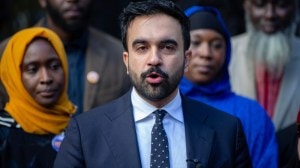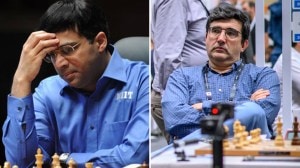Farah Pandith skips thorny issues
She is a good orator,like her boss Barack Obama. But would she be able to translate her words into action?
She is a good orator,like her boss Barack Obama. But would she be able to translate her words into action? Farah Pandith,US Special Representative to Muslim Communities,made that impression in the two venues Jamia Millia Islamia University and India Islamic Cultural Centre (IICC) where she addressed a predominantly Muslim audience on Wednesday.
Secretary (Hillary) Clinton has asked me to engage with Muslim communities around the world at the grassroots level,and to build and extend partnerships through the US embassies in both Muslim-majority and Muslim-minority countries. I have to look at out-of-the-box ways to engage,based on mutual respect. That is my job,my mandate, said Pandith,the US representative to Muslims in Europe in the Bush administration. She was speaking to an audience of academics,journalists and businessmen at IICC and students at Jamia Millia Islamia.
What kind of partnerships are on her agenda? What grassroots activity is she looking at via the US embassy? Pandith didnt go into specifics. Neither did she entertain such questions by the media. In fact,the media was not allowed anywhere near. She was more interested in talking to the Facebook generation,the youth.
At Jamia University she kept her speech short. It revolved around Obamas vision to engage with Muslims based on his historic Cairo address last year. She invited questions from students,in order to listen and understand them. She did indeed listen,but understand? When one student just uttered the word,Israel-Palestine,she cut him short and said,Thats not my job. I am not George Mitchell (US Mideast envoy).
When another student asked whether the US would reconsider its policy on West Asia and Pakistan,she said,I am not Richard Holbrooke (US Special Representative for Afghanistan and Pakistan). Its not my job to work on Kashmir or Pakistan. She avoided questions on American foreign policy the major bone of contention the Muslims have with the US.
She spoke about the diversity of American Muslims,about how she has prayed aside Turks and East Africans in a mosque built by Syrians and Lebanese dock workers in Quincy,Massachusetts,and that she learned to read the Quran at a mosque there. Thus,her sort-of disclaimer this is not an effort to increase the popularity of America by a few percentage points sounded hard-to-believe.
Though Pandith evaded foreign policy questions from students,she couldnt stop Muslim academics at the IICC from giving speeches that listed their reservations about the US State Department. Prof Akhtarul Wasey of the department of Islamic studies of Jamia University,in an indirect criticism of US occupation of Iraq,said,People of any country are competent enough to decide what system of governance suits them. And when he said peace in Palestine is indispensable for world peace,there was a loud applause and a grimace on Pandiths face.
Pandith seemed at unease when fellow Kashmiri,Dr G N Qazi,vice-chancellor of Jamia Hamdard University,said he wanted evidence of Obamas words and complained that he was denied visa on his diplomatic passport last year (because of my name) and got it after much protest.
At the end,Pandith spoke for less than five minutes,repeating her job description,as she did at Jamia,and without clarifying her governments position on issues raised.


- 01
- 02
- 03
- 04
- 05





























